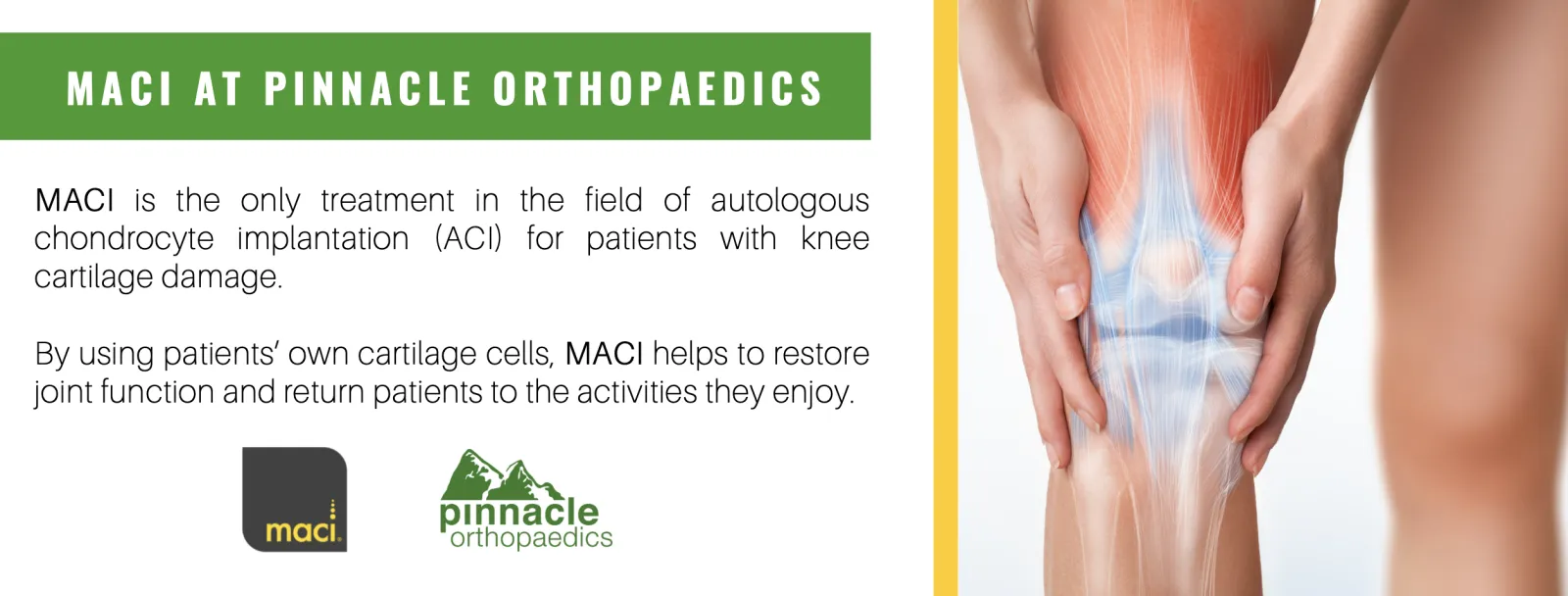MACI Procedure For The Knee
If you experience knee pain, you are certainly not alone. Millions of Americans struggle with knee pain, and over half experience pain due to cartilage damage.
Doctors at Pinnacle Orthopaedics use a new technique called Matrix-associated Autologous Chondrocyte Implantation (MACI) to treat cartilage damage in the knee.
You may be aware that cartilage cannot heal on its own. MACI knee surgery helps patients restore the function of the knee and return to their active lifestyles.
Pinnacle Orthopaedics is offering MACI procedure for the knee at the following office locations:
MACI Procedure Marietta
MACI Procedure Hiram
MACI Procedure Woodstock

What is MACI Knee Surgery?
MACI is innovative in that it involves regrowing the patient's own cartilage cells in an FDA-licensed lab and then replanting them to repair the damage.
The technique is a two-step process. The first step is a knee arthroscopy, whereby the surgeon will look inside the knee to assess cartilage damage. The surgeon will note the extent and map the size of the cartilage deficit.
Surgeons will then take a cartilage sample to send to the lab, where the cells will be used to regrow more cartilage cells to be placed during the second procedure.
A 3D structure is created that mimics natural cartilage, allowing for healing and lowered risk of complications. The special cartilage membrane is then implanted into the knee, where it continues to heal and regenerate, repairing the cartilage deficit.
What Does Recovery Entail After MACI Knee Surgery
After the surgery, nurses will immobilize your knee. Immediate care after surgery includes the RICE method (rest, ice, compression, and elevation).
Doctors will prescribe medication to manage pain and discomfort. It is important to take these medications only as directed.
You will follow a physician-prescribed rehabilitation program that starts shortly after surgery. The goal is to decrease pain, improve mobility, and limit swelling and stiffness.
Also, follow any wound care instructions described post-operatively. Always report any signs of infection immediately.
You will be able to participate in light activities such as walking shortly after surgery. You may need assistance with ADLs for a short while or when using crutches.
Physical therapy will work with you to progress and restore strength. By participating in exercises regularly, you will improve your recovery outcomes.
Are There Adverse Reactions with MACI?
During clinical trials, some patients experienced rare adverse reactions. These occurred in less than 5% of patients.
The most common adverse reactions after MACI knee surgery included:
Arthralgia (pain in the joints)
Tendonitis (swelling of the tendons)
Back Pain
Joint Swelling
Fluid in the joints
The most severe adverse reactions were pain in the joints, cartilage injury, treatment failure, and osteoarthritis.
Your doctor will work with you to minimize risk both before, during, and after the procedure so you can have a successful surgery.
Who are Good Candidates for MACI knee Surgery?
MACI is effective for the repair of symptomatic, full-cartilage deficits when conservative methods have failed. The following conditions are all appropriate for a MACI procedure:
Lateral Femoral Condyle (LFC)
Medial Femoral Condyle (MFC) with or without bone involvement
Patella cartilage deficits
Trochlea cartilage deficits
Deficits may be caused by either injury or from conditions such as osteoarthritis.
Where is the MACI Procedure of the Knee Performed?
Dr. Jessica Bilotta is treating patients with cartilage damage of the knee with MACI at the following Pinnacle Orthopaedic locations:
Dr. Bilotta is a board-certified orthopaedic surgeon and is fellowship-trained in sports medicine. She is available to see patients and discuss MACI- including implantation and the road to recovery.
Contact us with additional questions regarding your knee repair, including MACI procedure for the knee.The material contained on this site is for informational purposes only and DOES NOT CONSTITUTE THE PROVIDING OF MEDICAL ADVICE, and is not intended to be a substitute for independent professional medical judgment, advice, diagnosis, or treatment. Always seek the advice of your physician or other qualified healthcare providers with any questions or concerns you may have regarding your health.